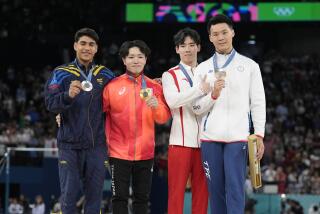Trying to Get Beijing to Go for Gold on Rights
- Share via
BEIJING — The video clip shows an Olympic runner approaching the starting line and readying himself for a race. He looks Chinese, as does the official with the starter’s pistol who raises his gun skyward. At the last minute, however, the official lowers the pistol and shoots the runner.
The clip by the French civic group Together Against the Death Penalty -- shown at film festivals and other venues in Europe before the lights dimmed in Athens -- suggests how quickly and aggressively human rights groups are moving to put China in their cross-hairs. Four years before Beijing hosts its big coming-out party -- the 2008 Summer Games -- the event is shaping up as one of the most controversial global sports events in recent memory.
The Olympics are no stranger to politics. And although China has made huge strides economically, its authoritarian political system makes it a prime target for human rights activists.
Civic groups are increasingly savvy about waging high-profile media campaigns to publicize their causes. They’re better coordinated. And the public is listening, given its rising interest in China as an economic powerhouse.
“Human rights groups looking at China are definitely riding this wave,” said Nicolas Becquelin, Hong Kong-based research director with Human Rights in China, a New York-based civic group. “Human rights is the barometer of a healthy political system, and we see this global event as a way to make China accountable. They need to do more than hold some big, perfectly scripted event.”
The International Olympic Committee would just as soon keep politics as far away from the stadiums and billion-dollar sponsorship deals as possible. Olympic history, however, is replete with examples of groups grabbing the spotlight.
Examples include Hitler’s 1936 bid to extol Aryan superiority. The raised fists of African Americans Tommie Smith and John Carlos as they collected their medals at the 1968 Mexico City Games. The murder of eleven Israeli athletes and coaches by Palestinians at the 1972 Munich Games. And the U.S. boycott of the 1980 Moscow Games over the Soviet invasion of Afghanistan, followed four years later by Moscow’s reciprocal boycott of the 1984 Los Angeles Games.
And it goes back much further.
“The modern Olympic Games are political, just as were the ancient Olympic Games,” said David Romano, a sports historian with the University of Pennsylvania. “Of interest, in antiquity, control of the Olympic Games sometimes came to military conflict.... There may have been some aspects of the same kinds of control and censorship.”
Activists say their bid to train a spotlight on human rights at the Beijing Olympics is based on a central premise: China as host should uphold the same standards and founding principles as the Games themselves. These, they say, include the preservation of human dignity and the harmonious development of man as outlined in the Olympic Charter and Code of Ethics. In the global village, even sports events should be held to a higher moral standard, they argue.
At the very least, they say, China should be prodded to fully abide by anti-torture conventions, expand personal freedoms, allow independent labor unions and make other significant improvements in the run-up to the opening ceremony.
“We’re not asking them to change their society,” said Vincent Brossel, an official with Reporters Without Borders, a Paris-based press and free-speech group. “That would be absurd. What we are calling for is freer information and an end to torture and the bad treatment of prisoners. That’s reasonable for an Olympics host. Nor are we saying do it in a week. They’ve got four years.”
Chinese government and Olympics officials didn’t respond to requests for comment, but Beijing has long argued that elevating its 1.3 billion people out of poverty is the most fundamental human right.
“The Olympic Games are about sports, which should be kept separate from politics,” said Wang Zhenmin, co-director of Qinghua University’s Constitution and Human Rights Center in Beijing. “The government is already paying more attention to these issues. This sort of outside pressure won’t encourage change.”
That hasn’t stopped advocacy groups from adopting a range of campaign themes and tactics. In the Czech Republic, an organization called Olympic Watch is using its contacts to pressure Beijing and to set up human rights benchmarks. It is calling on China to renounce the use of military force against peaceful democratic activities.
“As people with experience under a totalitarian regime in many aspects similar to China, we have insights into how they operate and how they use propaganda,” said Petr Kutilek, the group’s executive secretary. “We feel we have a certain obligation to help now since we’re now lucky enough to have freedom of speech.”
Britain’s Trade Union Congress believes the best way to fight for labor rights in China is by targeting apparel companies that manufacture in China and sell Olympic sportswear -- genuine articles must be vetted by the International Olympic Committee -- as well as the IOC itself to spur change.
“The IOC has a lot of leverage,” said Sam Gurney, a TUC policy officer. “We’re trying to get them to use it.”
Others rely on precedent and momentum. The Brussels-based International Confederation of Free Trade Unions is trying to convince Turin, host of the 2006 Winter Olympics, to require that suppliers linked to the Games respect labor unions, eschew child labor and uphold other fair-labor practices in hopes of spurring China to follow suit.
“Turin is interested, and that could become a model for future Olympics,” said Duncan Pruett, the group’s campaigns coordinator.
In some cases, groups are using China’s own commitments as ammunition. Reporters Without Borders, which has a campaign called “Boycott Beijing 2008,” says that in its eagerness to win the Games, China agreed in 2001 to give members of the international press the same type of access they had in other host cities. This includes the ability to report freely on Chinese society in general and issues outside the stadium.
China is already backpedaling, however, the group says, by suggesting it will limit coverage to events on the playing field.
Freedom-of-speech advocates also fret that China’s plans to funnel all Olympic broadcasts through its own satellites gives it unprecedented control over what the world sees.
Hosting the global press corps is never easy, but early indications suggest China has a ways to go. Plainclothes police allegedly beat up two foreign photographers covering the Aug. 7 Asian Cup between Japan and China. A report in the government-run New China News Agency has blamed fans, a contention the photographers strongly contest.
Agencies differ in assessing what impact their pressure will have on China. Some argue that the attention on human rights surrounding the Games will be a positive force for change, given the importance of saving face in Chinese society. Others say China tends to become more obstinate when directly challenged, particularly by foreign groups, and has a history of stepping up arrests, relocating dissidents and shutting down expression before showcase events.
IOC officials say the U.N. and other qualified groups, not the IOC, should monitor human rights. Under mounting pressure, however, President Jacques Rogge told a news conference in Athens in August that “human rights should be respected as much as possible,” a statement civic groups say they hope to use as leverage.
Given all the criticism it is likely to attract, some wonder what Beijing was thinking when it signed on for the Games.
“I’m surprised the IOC granted the Games to China.... And it’s a big gamble for China to invite this kind of scrutiny,” said Thea Lee, chief international economist with the AFL-CIO. “It could really backfire.”
When the IOC picked a nondemocratic country with a checkered human rights history to host the Games, it argued that the event would spur change. The IOC is proud of its “Olympic effect” in terms of buildings and infrastructure that outlast the Games, but should also work on spurring positive social change, activists say.
Chinese human rights groups with strong links to the government argue that China doesn’t need the “wrong kind” of foreign journalists or activists.
“Some so-called human rights groups maliciously attack China without solid facts,” said Liu Wenzong, a director of the Chinese Society for Human Rights Studies. “With their rose-colored glasses and inherent bias, they’re impossible to satisfy.”
There are signs of progress, some add. Beijing recently added a section on human rights to its constitution, and people have more liberty to discuss politics among themselves.
“China will listen to constructive suggestions,” Liu said.
“This is exactly what we heard at that point from our Communist leaders, that the West is interfering in domestic affairs and that they do a lot of things for their people the West doesn’t do,” said Kutilek from Olympic Watch. “We haven’t seen any credible human rights improvement in the three years since they won the Games. We should avoid the Olympics becoming a propaganda tool for the government.”
More to Read
Go beyond the scoreboard
Get the latest on L.A.'s teams in the daily Sports Report newsletter.
You may occasionally receive promotional content from the Los Angeles Times.






